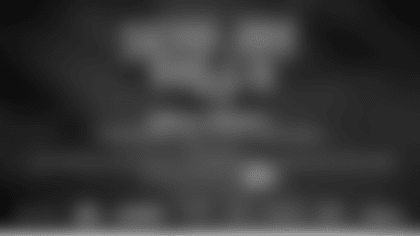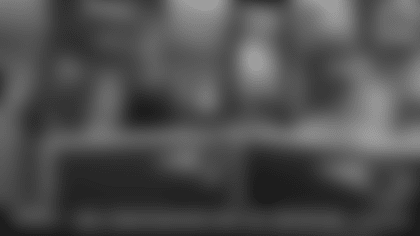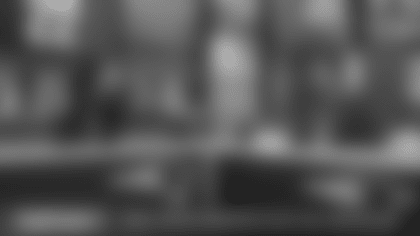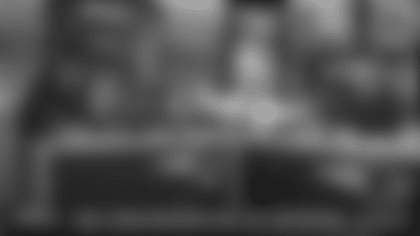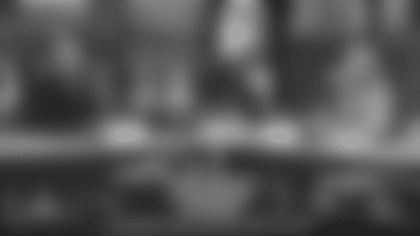BB: We have a big challenge here this week with the Redskins. I think this team really starts at the top with Mike [Shanahan] and the coaching staff. They have a real experienced staff and I think they do a very good job. They have a lot of tough schemes to deal with and as I said, they're very experienced so they definitely know what they're doing. Mike and Kyle [Shanahan] do a great job offensively with their formationing and personnel usage and so forth. It's always hard to prepare for them; you always get something in the game that you're not quite ready for. They do a good job of attacking defenses - that's always been a problem. Jim [Haslett] does a real good job on defense with the schemes that they have. They have a number of different pressure packages. They're really stout against the run, they've got a lot of really good players on defense and on special teams it's an extremely explosive group with great specialists, returners, kickers [and] cover players. Again, they're a very experienced kicking team - a lot of veteran players on the units and they definitely know what they're doing. We have a lot to get familiar with here in a short amount of time, both from a player standpoint and also from a scheme standpoint. They really challenge you in all three phases of the game. Like I said, they're extremely well coached. They've got a lot of explosive players, guys that can ruin the game in a hurry in all three phases of the game [that] we're going to have to do a good job on. We have a lot of preparation to do this week.
Q: You said you're not that familiar with the Redskins. Does it help you at all that they played one of your division opponents before playing you or does it not matter at all?
BB: I think it's a little bit easier to see some of the matchups. We know the Jets and so we see how they match up against their players. That will be better than them playing, like the week before when they played Seattle, who we don't really know anybody on Seattle and we're not familiar with Seattle. But I think you can see, like when they play the Jets, 'Okay, this is what they're doing.' We see how they're trying to attack the Jets because we know the Jets. I do think there's some value in that. We've also seen them play Buffalo of course, and Miami - all three division games. Those are helpful because we know our teams in the division and we can kind see, 'This is what they're after, this why they're doing this, this is why they're doing that.' It makes more sense than watching them play the Arizonas and the Seattles and teams like that that we're a lot less familiar with. There is some value to that. You study every game but it's a lot easier to watch the teams that we know, and we've played Dallas and we've played Philadelphia and we've played the Giants, so there's some degree of useful information there because of what we know about the other teams.
Q: What kind of impact has Jabar Gaffney had on that offense?
BB: Of course, we know Jabar is an excellent route runner, he's a good receiver, very disciplined and dependable guy. He and [Santana] Moss do a good job for them on the outside. They do a number of different things. Again, they change their passing game around from week to week. Mike [Shanahan] and Kyle [Shanahan] do a good job of that. They have a lot of core concepts but they build them from different formations, different personnel groups. And then they usually have a few patterns each week that really attack that particular team that they're playing, whether it's the individual personnel or the scheme that they're using and they do a good job of that. Jabar, we know is a really intelligent receiver and very instinctive. I'm sure he handles those things well for them - taking routes that they haven't really run before and then putting them in for that game and running them the way that it really hurts the team that they're playing. That's a big part of what they do also.
Q: When you guys sign veterans, it seems like you bring in guys who are really good in the locker room and then see what they have on the field, like Alge Crumpler last year and Andre Carter this year. What has been Carter's best contribution on the team this year? Is it in the locker room with teammates or on the field?
BB: It's both. We need players that can play and he's done a good job of that. Certainly bringing a professional approach to the game, that's great too. He's done a good job at everything. He's very attentive. He's in excellent physical condition, he's out there, he takes a lot of plays, he plays them hard in practice and the games. He's very professional in his approach. We've asked him to do some different things, he's embraced those and tried the things that he knows how to do, do; the things that are a little bit new or different for him, he's tried hard to learn and understand how we want those things done. Very unselfish player that works hard [and] is consistent. You get the same effort out of him every day, seven days a week, whatever this is, [16] games or however many we've played. He's really the same dependable player on a daily basis with a lot of consistency. All those are strengths. I don't know how you rank them, but they're all important. He does a great job at all of them. He's been such a pleasure to have on this team and he's added a lot to our football team in a lot of different ways.
Q: When you brought James Ihedigbo in, did you know that he was a guy that not just what he does on the field but it seems like a lot of new guys say that he's helped them out?
BB: I think that's one of James' strengths too. Again, very smart, professional guy, works hard. There were times that he had a smaller role on defense; now he has a larger one but, I think we saw him prepare the same way regardless of what he was being asked to do. He really worked hard at his job, tried to be the best he could, tried to be fully prepared and ready. He was thrown into some situations that he didn't get a lot of reps on or a lot of practice opportunities but he was prepared for them, he was ready, took advantage of them and those led to more opportunities. I would say those two guys [Andre Carter and Ihedigbo] are very much alike and a lot of the things that they do in terms of their approach, preparation, professionalism off the field, communication, all those things are exceptionally good.
Q: A lot of your defensive leaders have missed some significant time with injury so a lot of your younger players have had to step up. How have they responded to that?
BB: They've been thrown into the fire, so they've had to, yes. They've just been forced into action. Some guys, like last week, guys that haven't even played ended up playing a lot for us in that game. Everybody has to be ready; you never know when those opportunities are going to come. I know that the players that get the opportunities - you never want to see anything happen to anybody, but the same time, they're excited for their opportunity and their chance to play and to take the hard work that they've had on the practice squad or as a backup player or whatever, to be able to now go out there and now have an opportunity to play in game situations is exciting for them and they've taken advantage of that in a lot of cases. It's challenging but at the same time, it's an opportunity. If you're looking for an opportunity, then you embrace it when you get it.
Q: How much better can your team be when you have that kind of game experience?
BB: I don't know. We just try to get better every day and do the best we can. We'll see where it takes us. I don't know.
Q: If more guys have experience in the system that would be better than fewer guys, that would be fair to say, right?
BB: I mean there are advantages to that. There are also a lot of advantages to having the same guys do it over and over again continuously with each other. Whatever the opportunities are, we'll try to make the most of them.
Q: How unusual is it for a rookie like Nate Solder to be asked to handle so many responsibilities, not just right tackle but tight end and eligible receiver and moving him along the line?
BB: Yeah, kickoff return, field goal team. Nate has done a lot for us this year. He's been thrown into a lot of different situations. I think to a degree, that's been challenging but again, Nate is a smart kid. He works very hard, he has a good understanding, he has a good football background, he understands concepts well; it's not just memorizing what he does, but he understands what the people around him are doing. We've asked him to do a lot. Like I said, we've thrown him in on the kickoff return here the last few games. He's done a great job with that in terms of understanding it, making adjustments, doing something that he really hasn't done before. Same thing on the field goal team. He's worked hard to do the things we've asked him to do and he has a lot of flexibility as an athlete and as a person.
Q: When did you first get an indication that this was a kid who could handle all that?
BB: When we started playing him at left tackle and right tackle in training camp. We flipped him back and forth and that's not an easy thing to do. We tried doing that with [Matt] Light his rookie year and that didn't work out very well. You never know how that's going to go. Matt has had a tremendous career at left tackle, but the flipping him back and forth probably wasn't the best thing to do for Matt to start out with, whereas Nate has handled it very well. Sebastian] Vollmer handled it; it wasn't a big problem for Sebastian. Some guys, they can do it; some guys, they don't do it as well and they're still very good players at what they do. I think we saw it with Nate pretty early.
Q: How does the Redskins not having Fred Davis and Trent Williams available affect what you guys are able to do?
BB: I think that they'll still do pretty much what they do. But they're two very good players of course. Williams has done a real good job for them at tackle. I think he's played well all year, but especially the last three or four weeks he's really done a nice job. Davis has emerged as one of their leading receivers. He's made a lot of big plays for them, he's caught a lot of balls, he's done a good job blocking, and he's a good player for them too. I'm sure they'll miss those guys. At the same time, just like we talked about on our side of the ball, [Roy] Helu got in there and I don't know, he might be their best back now, even if they had [Tim] Hightower. He's done a great job for them. Whoever the next guy is, if it's [Mike] Sellers or however they decide to go, I'm sure Mike [Shanahan] and Kyle [Shanahan], they're two of the best offensive game plan coaches that we've gone up against, I'm sure they'll utilize the personnel that they have and give us a lot of problems with it, however they decide to do it.
Q: When you mix up carries for your running backs, especially on early downs, is that a matchup thing specific to the plays you're running or just trying to find the hot hand?
BB: I would say probably neither one. It's probably more just a certain player is in with a certain group, whatever that group is. Then the plays that we have with that group are the plays that that player is - everybody is responsible, but those are the ones that he's gotten the most practice at.
Q: Does that change week to week?
BB: Sure, it could. It doesn't have to, but it could. Depending on what we want to try to do with that group, how much we want to be in certain formations, what the protections are going to be this week, what type of routes we're going to ask those guys to run, what kind of runs we're going to be running. Sometimes it changes from group to group, the type of plays that you're using because in one group they might be in their regular defense. Washington is a perfect example. In their regular group, they're in their 3-4 defense and they play that kind of one way and when they go to their nickel package, it's a different front, it's different techniques, it's a whole different look. Pass protection becomes much more of a mental issue of who to block and who you've got and all that, whereas in a 3-4 defense it isn't so much who to block, it's blocking them; that's the issue. Things like that change a lot and what you're trying to do offensively, your matchups, your personnel groupings, who you want in there doing what - that's really where a lot of that discussion comes in. That being said, if you have a guy that's in there and he's not available, somebody else has to be go in there and do it, so everybody has to be prepared for it. There are times that we feel like we've been able to stress the defensive matchups based on which back or which receiver. Sometimes the receivers change in personnel groups too and it's just kind of the same thing, you try to create matchups or force them to defend different players the same, then you can gain an advantage. If they defend them differently, that opens up something for somebody else.
Q: Have you noticed that Stevan Ridley turns his back on contact? Is that a concern? It's almost like a half-spin move.
BB: I mean I think there are a lot of things to talk about with running backs and each back has their own style. In the end, backs want to gain yards and we want them to gain yards. There are still some fundamental things that you want to start with. If you evolve off those as the back becomes more creative in his run style, then there is certainly a place for that, but hopefully that will come as a secondary part of it and the first basic fundamental part of it will be the same for all the backs as far as their entry point into the hole and their basic technique of ball handling and approaching the line of scrimmage and so forth. It can get creative after that. There's certainly room for improvement, I'd say, with all of our backs in their running techniques, just like there is at every other position. You just don't get the ball and start running. You use the blockers that you have in front of you. Sometimes it's not always clean and there's a little bit of a feel for that between the back and the linemen and so forth. There are things we still need to work on and get better at.
Q: What does Rex Grossman do well?
BB: First of all, I think he has a lot of confidence and I think his team has confidence in him. I think that's a good starting part. The feeling you want your offense when you go on the field is that we're going to move the ball and be successful. I think he brings that. He can be accurate, he's got some mobility in the pocket, he's a tough kid and he'll stand in there and get hit and throw the ball. He's made some real good throws down the field, play action. He's hit a lot of big plays. He can get out of the pocket on bootlegs and plays like that. I think in his aggressiveness, there are probably some throws that he'd like to have back. I think that's part of what makes him good is that he is aggressive. Defensively just because it looks like you have fairly good coverage on a player doesn't mean he won't try to stick it in there. Sometimes he makes plays and sometimes it doesn't quite get into that spot, but he's definitely not afraid to be aggressive and throw it in there. I think defensively you have to respect that.
Q: Are you satisfied with the amount of pressure you've gotten on opposing quarterbacks?
BB: [We] always try to get more pressure, always try to have better coverage, always try to run the ball better, try to throw it better, try to score more points. We try to do that every week.
Q: There is some jockeying going on between two networks about your game against the Broncos -
BB: I don't really care about the Broncos game right now; I'm worried about the Washington game.
Q: I'm just curious about the logistics -
BB: I don't really care about it. When they tell us to play, we're going to show up and play the game. When it happens, it happens. Right now, I'm worried about Washington.
Q: Is the fact that you've never won at Washington something that -
BB: That we take a lot of pride in?
Q: Is it something that you're crossing off your list?
BB: No. Well, of course we want to win in Washington. We want to win because Washington is the next game. If we were playing in the parking lot at the Expo Center, we'd want to win there too. It doesn't make any difference. We want to beat Washington because that's our next game. That's what we're here for.
Q: Is there anything that is keeping Dane Fletcher from playing other than a thumb injury right now?
BB: I think when Dane is healthy, when he's healthy enough to play, that I would expect him to contribute for us.
Q: So it's just the thumb injury?
BB: I think it's a combination of things. It's a combination of being healthy enough and then be able to get enough reps on the practice field to perform your job well enough to play. There's conditioning, there's execution, there's timing, there's all those things. When that happens, then the player is ready to play. Until that happens, then he is less than ready to play. It doesn't mean you couldn't play him anyway, but optimally I think you'd want to play the guy when he is fully ready. That's true for every player. It's not just being healthy; it's being able to perform on the field at a level that's at a high competitive level for what we're doing.



